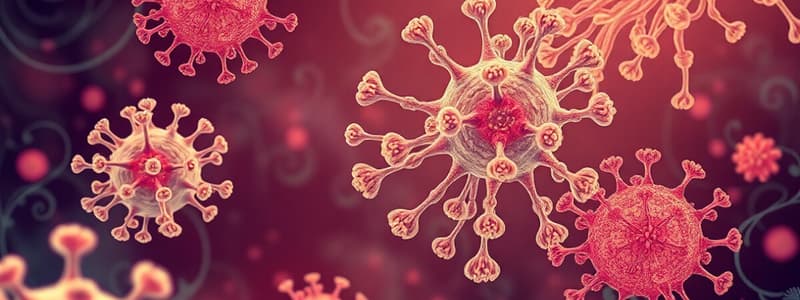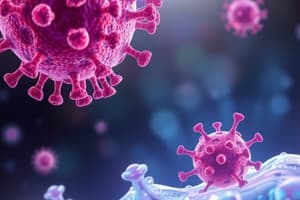Podcast
Questions and Answers
What is the main function of an adjuvant in a vaccine?
What is the main function of an adjuvant in a vaccine?
- To directly kill pathogens in the body
- To replace the need for antibodies
- To enhance the immunogenicity of immunogens (correct)
- To serve as the active ingredient in vaccines
Which of the following is true about antibodies?
Which of the following is true about antibodies?
- They exist only in membrane-bound forms
- They are primarily produced by T lymphocytes
- They are classified as g-globulins (correct)
- They are produced exclusively in the presence of pathogens
Which adjuvant is FDA approved for human use?
Which adjuvant is FDA approved for human use?
- Squalene
- Thimerosal
- Freund's complete adjuvant
- Aluminum hydroxide (correct)
How do adjuvants primarily enhance the effectiveness of vaccines?
How do adjuvants primarily enhance the effectiveness of vaccines?
What is a characteristic of Freund’s complete adjuvant?
What is a characteristic of Freund’s complete adjuvant?
What is the primary characteristic that differentiates immunogens from antigens?
What is the primary characteristic that differentiates immunogens from antigens?
Which size of molecules is generally considered immunogenic?
Which size of molecules is generally considered immunogenic?
Which of the following is NOT a requirement for immunogenicity?
Which of the following is NOT a requirement for immunogenicity?
What describes a hapten?
What describes a hapten?
Which type of antigens are known to be very immunogenic?
Which type of antigens are known to be very immunogenic?
Cross-reactivity refers to:
Cross-reactivity refers to:
Which of the following statements about doses and immunogenicity is true?
Which of the following statements about doses and immunogenicity is true?
Which of the following classes of antigens are rarely considered immunogenic?
Which of the following classes of antigens are rarely considered immunogenic?
What is the primary function of IgM antibodies?
What is the primary function of IgM antibodies?
Which of the following statements about IgA is correct?
Which of the following statements about IgA is correct?
Which type of antibody is known for placental passage?
Which type of antibody is known for placental passage?
What is the function of the hypervariable regions in antibodies?
What is the function of the hypervariable regions in antibodies?
Which antibody class is primarily responsible for mediating allergic reactions?
Which antibody class is primarily responsible for mediating allergic reactions?
What is a common characteristic of IgG antibodies?
What is a common characteristic of IgG antibodies?
Which function is NOT associated with IgG?
Which function is NOT associated with IgG?
Which of the following is NOT a function of antibodies?
Which of the following is NOT a function of antibodies?
Flashcards
Immunogen
Immunogen
A molecule capable of inducing an immune response.
Antigen
Antigen
A molecule that specifically binds to antibodies or T cells.
Immunogenicity
Immunogenicity
The ability of a substance to elicit an immune response.
Hapten
Hapten
Signup and view all the flashcards
Epitopes
Epitopes
Signup and view all the flashcards
Antigen processing
Antigen processing
Signup and view all the flashcards
Cross-reactivity
Cross-reactivity
Signup and view all the flashcards
Requirements for Immunogenicity
Requirements for Immunogenicity
Signup and view all the flashcards
Adjuvant
Adjuvant
Signup and view all the flashcards
How do adjuvants work?
How do adjuvants work?
Signup and view all the flashcards
Aluminum hydroxide
Aluminum hydroxide
Signup and view all the flashcards
Freund's complete adjuvant
Freund's complete adjuvant
Signup and view all the flashcards
Antibodies are g-globulins
Antibodies are g-globulins
Signup and view all the flashcards
Antibody Functions
Antibody Functions
Signup and view all the flashcards
Hypervariable Regions
Hypervariable Regions
Signup and view all the flashcards
IgG Subclasses
IgG Subclasses
Signup and view all the flashcards
IgG Functions
IgG Functions
Signup and view all the flashcards
IgM Function
IgM Function
Signup and view all the flashcards
IgA Function
IgA Function
Signup and view all the flashcards
IgE Function
IgE Function
Signup and view all the flashcards
Antibody Levels in Life
Antibody Levels in Life
Signup and view all the flashcards
Study Notes
Immunogens, Antigens, and Antibodies
- Immunogens induce an immune response
- Antigens bind to antibodies or T cells
- All immunogens are antigens, but not all antigens are immunogens
Requirements for Immunogenicity
- Foreignness: Do not respond to self (except in autoimmune diseases). More foreign = more immunogenic
- Size (molecular weight): Larger than 6kDa are generally immunogenic; smaller than 1kDa are not (e.g., penicillin, aspirin)
- Chemical Complexity: Homopolymers of amino acids are not immunogenic
- Degradability: Susceptibility to enzyme breakdown is important for antigen presentation
- Stability: Must be stable enough for antigen presentation
- Dosage: Insufficient doses can lead to tolerance. Repeated administration may be needed for a sufficient response
Hapten
- Low molecular weight; antigen but not immunogenic
- Non-immunogenic by itself
- Conjugation with an immunogenic compound (carrier) creates an immunogen
- Antibodies to hapten
- Antibodies to carrier
- Antibodies to conjugate
Epitopes Recognized by Lymphocytes
- B-lymphocytes recognize epitopes on surface antigens
- T-lymphocytes recognize epitopes on peptides presented by MHC molecules
Major Classes of Antigens
- Carbohydrates (polysaccharides): Immunogenic as part of glycoproteins
- Lipids: Rarely immunogenic
- Nucleic Acids: Generally not immunogenic; seen in systemic lupus erythematosus (SLE)
- Proteins, Glycoproteins: Very immunogenic
Major Classes of Antigens
- One epitope: Examples are haptens
- Many epitopes of the same specificity: Examples include many polysaccharides and homopolymers
- Many epitopes of different specificities: Examples are proteins
Cross-reactivity
- Ability of an antibody specific for one antigen to react with a second antigen
- Common with closely related antigens (ex. toxin and toxoid)
Adjuvant
- Substance mixed with an immunogen to enhance its immunogenicity
- Mechanisms:
- Physically prolonging antigen persistence/release
- Causing local inflammation and immune cell proliferation
- Improving antigen uptake and processing
- Human Adjuvants: aluminum hydroxide/phosphate (FDA approved)
- Animal Adjuvants: Freund's complete adjuvant
Antibodies
- Gamma globulins
- Produced by plasma cells (B lymphocytes)
- Exist in secreted and membrane-bound forms
- Form the B cell receptor on the surface of B cells
Why do we need antibodies?
- Neutralization of toxins/viruses
- Immobilization of bacteria/parasites
- Activation of complement
- Initiation of opsonization
- Antibody-dependent cell-mediated cytotoxicity (ADCC)
Antibody Structure
- Antigen binding, located in hypervariable regions
- Light chain
- Heavy chain
- Disulfide bonds
- Fc region
Hypervariable Regions
- Highly variable amino acid sequence
- 3 Hypervariable regions in light and heavy chains
Five Major Classes of Antibody
- IgM, IgG, IgA, IgD, IgE
- Detailed information about each isotype is included in separate tables regarding; -molecular weight- -half life- -distribution- -important features
Distribution of various Ig isotypes in body fluids
- Shows distribution of antibody in serum and secretions.
IgG- Four Subclasses
- IgG1, IgG2, IgG3, IgG4.
- Specific details about the features of each.
- Includes placental passage
- Opsonization
- Fc receptor
IgG - Antibody-Dependent Cell-Mediated Cytotoxicity (ADCC)
- Activation of complement
- Toxin/viral neutralization
- Bacterial immobilization
IgG - Antibody Levels Early in Life
- Shows the progression of antibody levels in early human development, from conception to adulthood.
IgM
- First immunoglobulin produced after infection or immunization
- Most efficient immunoglobulin for complement fixation
IgA
- Primarily found in secretions (tears, saliva, sweat, mucus)
- Critical component of respiratory and mucosal surfaces (first line defense)
- Roles include antibacterial and antiviral activity
IgE
- Mediates type I hypersensitivity reactions
- High levels seen during parasitic infections
Studying That Suits You
Use AI to generate personalized quizzes and flashcards to suit your learning preferences.




